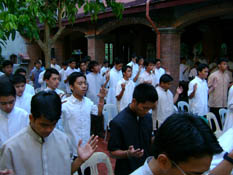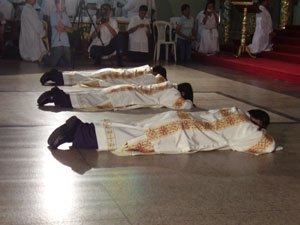|
ST. PETER'S COLLEGE SEMINARY |
|
|
Student Programs
Objectives of St. Peter’s College Seminary The
St. Peter’s College Seminary, directed by the clergy of the Diocese of San Pablo, is an ecclesiastical center which,
according to the norms of the Codex Iuris Canonici (1983) and the documents of the Magisterium, aims to give a suitable training
to candidates to the priesthood, who come from different parts of the All
activities of the seminary aim to provide a strictly priestly training, such that true shepherds of souls are formed after
the example of Our Lord Jesus Christ, Teacher, Priest, and Shepherd, and that they are prepared for the ministry of teaching,
sanctifying, and leading the people of God (cf Decree Optatam totius, n. 4) in the local Church. The
primary objective of the seminary is to serve the particular Church in
 Academic Programs The Pre-College Department The Pre-College Department is a one-year formation and discernment for young high school graduates who aspire to be
priests in the Diocese of San Pablo. Before entering a major seminary, they have to pass this year of intensive academic,
spiritual, and doctrinal formation for them to realize the profound meaning of the vocation to the priesthood. They are introduced
to a life of prayer, pastoral zeal, and intellectual formation. Although not yet credited by CHED, this academic year is an
indispensable prerequisite to promotion to the philosophy department. In the formation year, the candidate has to go through personal discernment with the help of his spiritual director
in order to see clearly his call to the priesthood. It is the most adequate period for the formators to see if a candidate
is truly fitted physically, intellectually, emotionally, and spiritually to the priesthood. It is a seminary policy that in order for a student to qualify to college proper, he must obtain a general weighted
average (GWA) of 85 in the subjects taken in two semesters. Nonetheless, there are two options left for those who cannot reach
the required average-either they are sent out of the seminary or if there are some redeeming factors and a clear sign of vocation,
they may repeat one year of the pre-college course. However, an average of 85 is not an assurance that a pre-college student
can pursue the philosophy course. For some serious valid grounds, he may be refused admittance. The subjects offered in the Pre-College Department are: English A and B, Speech A and B, Basic Latin, Salvation History,
Basic Math, Research and Term Paper Writing, and Theater Arts. The Philosophy Department The Philosophy Department assumes the responsibility of molding the seminarians holistically and preparing them for
theological studies until they finally commit themselves to the service of the Lord and His vineyard. The Philosophy course
comprises a four-year study of major philosophy subjects and other field of sciences required by the Commission on Higher
Education (CHED) and some subjects in Theology, Music, and Latin. A graduate is granted the degree of Bachelor of Arts major
in Philosophy, minor in English (with diploma).
The Seminary Program The
seminary program comprises different aspects of seminary life which are involved human, spiritual, intellectual, and pastoral
formation. The human formation
of a seminarian in college must recognize the fact that he is in a period of transition from adolescence to young adulthood,
from dependence on family and peers to personal freedom. In other words, a typical college seminarian is in search of his
identity and lives within the tensions that usually accompany that search. (UPPPF, #188). The Casa Virtutum has been implemented to impart teachings and practices regarding basic human values and Christian
virtues in a weekly communal chat. Each seminarian is encouraged to foster a family-oriented ambiance in the seminary.
 The
spiritual formation of a college seminarian aims to awaken and develop in him a sense of the sacred in
life through spiritual exercises and spiritual direction, so that he could be a good Christian and be able to crystallize
his decision to follow Jesus Christ in the ordained ministry. Through personal guidance and structural help, a college seminarian
will hopefully begin to appreciate the value of spiritual exercises beyond compliance with rules to develop the discipline
necessary for a solid spiritual life and to see the unity of prayer and life. (UPPPF, #207-208). The monthly recollection
is an important activity. Due to the scarcity of priests and for greater religious freedom, the seminarians are allowed to
have priests outside the seminary as their spiritual director after consulting with the appointed spiritual director of the
seminary.
The
intellectual formation seeks to develop not only the seminarians academic excellence but also his capacity
to face intelligently whatever life he might pursue. In a college seminary, this formation should be preparatory to and in
consonance with the formation in a theology seminary. It should develop skills and provide knowledge necessary for theological
studies. The thrust of intellectual formation in a college seminary is not very different from that of a regular liberal arts
program that stresses the appreciation for the natural and human values. Intellectual growth in college is aimed at a deeper
understanding of people, of human experience, of the world, and of history. This in turn hopes to help develop conviction
and values which can enrich him in his personal and vocational life. (UPPPF, #232-234)
The pastoral formation of a college seminarian aims to
help him face the questions arising from his stage in life as he comes face to face with the demands of service. Pastoral
exposure to and involvement in a specific community or ministry is meant to strengthen his self-identity and to crystallize
his mission which can occur only when he has discovered the meaning of service to others. It cannot be denied, however that
shepherding is not yet a realistic goal, much less the primary goal of the pastoral formation of a college seminarian. The
emphasis rather lies in self-discovery through growth in service. (UPPPF, #257) There are areas in the city of San Pablo where
seminarians are sent for the pastoral service: Paaralang Pag-ibig at Pag-asa, Bahay Pag-ibig - Home for the Aged, Sto. Angel
Annex School, and the Parish of Immaculate Conception for BEC exposure.
|



